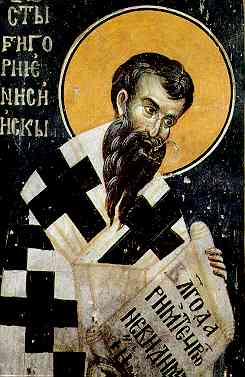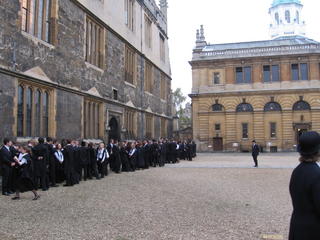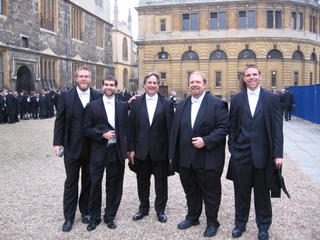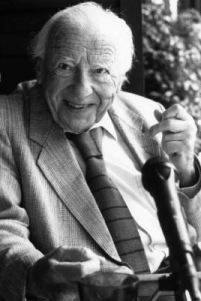
So expository preaching is fine. I mean it is great to sit through an hour long sermon on Song of Songs chapter 4 and feel like you can atomize the whole thing to a person walking down Broad Street, but is it really that benificial? I mean, in a society that values image and emotion over word and reason (if it doesn't offend you, read "postmodern") should we really be doing this expository stuff all the time? I feel like the pastors should be wearing WWBRP (what would Bertran Russell preach) braclets. How should we preach? What is the most effective way of getting "the Word" out today?
I have been reading a bunch of Gregory of Nyssa for my essay due Monday (The influence of Plato and Plotinus on Gregory of Nyssa's conception of the soul - awesome) and one of the books Gregory wrote is called The Life of Moses. This book is amazing and I recommend it to anyone who wants to get a feel for this fourth century mystical theologian (the founder of mystical theology?). The book is a discussion of Moses' life centred around three key events - the burning bush, the Mt. Sinai experience, and God's passing by Moses in the cave (Exodus 3,19, and 33-34 respectively). Gregory takes us through these events historically but then goes into the "spitirual" meaning of all these things. This is what I want to discuss.
The "spiritual" interpretation of Holy Scripture is something very ancient in the Church, and something totally lost to us today except in some bootlegged form (above pastor saying the Song of Songs is about the Church). This was called the allegorical method of preaching, and I would like to make a short case for why it might be helpful to bring back to the Church today. First off though, it needs to be said that the allegorical interpretation is a difficult thing to do well. Just take a look at Augustine's interpretation of Genesis 1-2 or Thomas Aquinas' interpretation of the Good Samaritan. Unbelievable. I think there is a right way to use this method and a wrong way. Gregory of Nyssa strikes me as the best example of the right way to do it. He clearly emphasizes the historical meaning of the passages, but he goes on to discuss its spiritual significance. I think this comes from his very healthy understanding of "overflow of Being." Gregory is a philosopher-theologian in the strongest sense and feels free to use Plotinus whenever the Scripture warrants it. His greatest achievement is the understanding (or lack thereof) of the Divine infinity. Gregory as a Cappadocian Father is clear about God being beyond finitude, beyond comprehension, beyond reason. This leads later theologians to the via negativa (we can only say what God is not) and also leads the Eastern Fathers to talk about God's essence and His energies (we can't know His essense, only His energies - His actions). I think this is incredibly realistic and not well understood by the Western tradition where we are confident in our reason's power over creation (and the Creator).
So Gregory uses this understanding of the Divine infinite to undergird his exegesis - there is always more to say about God then we can ever say. So for instance in the section of Moses going up the Mountain to see God and entering the "dark cloud", Gregory sees a perfect time to talk about God's essential "darkness" (cf. Isaiah 45, "the hidden God"), His unknowability and His being beyond comprehension. Did Moses intend to write about God's infinite and transcendent being when he dictated Exodus (or it was passed down or what have you, but no JEPD please)? I don't think so, but it is certainly part of the text. You can never say enough about God, you will never exhaust His meaning from the Scriptures. This is what I mean by "overflow of Being." There is more in the text than could ever be spoken about.
Another example: in the event of God passing by Moses He only lets Moses see his back side, for "You cannot see my face, for man cannot see me and live." On one level this is fairly straightforward - God is too Holy to be seen by mortals. But is there more? Gregory goes on to says the following
"Scripture does not indicate that this causes the death of those who look, for how the face of life ever be the cause of death to those who approach it? On the contrary, the Divine is by its nature life-giving. Yet the characteristic of the divine nature is to transcend all characteristics. Therefore, he who thinks God is something to be known does not have life, because he has turned from ture Being to what he considers by sense preception to have being."
He goes on to say that "True Being is true life. This Being is inaccessible to knowledge." Gregory is pointing us away from carnal desires and reasonable desires to contemplate and seek God by faith - to seek Him through the very gift He has given us to see His face - faith in Jesus Christ. Again, was this the purpose of Moses "writing" this story? Probably not, but clearly it is more than an application of this text. It is a true reading of the Holy Scripture.
Are there any practical reasons for using an allegorical interpretation (done well of course) today? I think so. Firstly, people are captivated by story, not straight fact telling. I think the allegorical method is a great way to display the truth of God's Word to those listening in an easy way to understand and remember. I bet that whenever you hear Moses' story of the mountain you will always be reminded of God's "beyond rationality, His unknowability and true life." Allegorical preaching may be a wonderful way to remind people of both God's eternal truth and also keep them close to the Biblical story (you can't talk about God's "cloud of unknowing" without being drawn deeper into the text of Exodus 19). Secondly, I think in an age of image over word, this method has a better ability to imapct people's minds. It is based on a deeper meaning, something that requires a inner vision of the story to keep it grounded. Anything that involves people's imaginations is bound to stick better than rote fact telling. It is much easier to paint a picture with the allegorical method than the expository method because it is itself totally about behind reality and pictures within a narrative. We see God's nature being revealed through another picture. Thirdly I think this approach is a Biblical one. Not just because Jesus taught in parables (alright, but not too powerful on my watch) but because it is very similar to what Matthew does in his Gospel.
A bit more on this. In Matthew we find tons of "fulfillment" of prophecy. But the serious issue is that most of these "prophecies" aren't prophetic at all. Take the Hosea one: "Out of Egypt I have called my son." (Hosea 11:1). This is a historical statement in the Old Testament talking about the exodus and reminding the people of God's kindness to those in exile (which at the time the nation of Israel was). What has Matthew done? Clearly he is not ignorant of the fact that this is not a prophecy, rather he is using the Rabbinical tradition of Midrash - using Scripture as a "jumping off point" to further truth. Matthew is using Hosea 11:1 to remind people of how God always works. No Jew would have though Jesus was fulfilling a specific prophecy in Hosea ("check Hosea 11:1 off the list, now on to Micah and Zechariah, etc"), but Matthew would have reminded them that just like when YHWH brought His people out of Egypt before, again He has brought His people out of exile, for in Jesus the whole nation of Israel is wrapped up - past, present and future. So allegorical interpretation is just like this, using the text as a spring board, a jumping off point to discuss something always true about the covenant and eternal God.
So I think there is someting rich in the allegorial tradition, something which might be important in the Church today. Now all I need to do is figure out a way to preach allegorically on divorce (my sermon coming up). Any suggestions?







